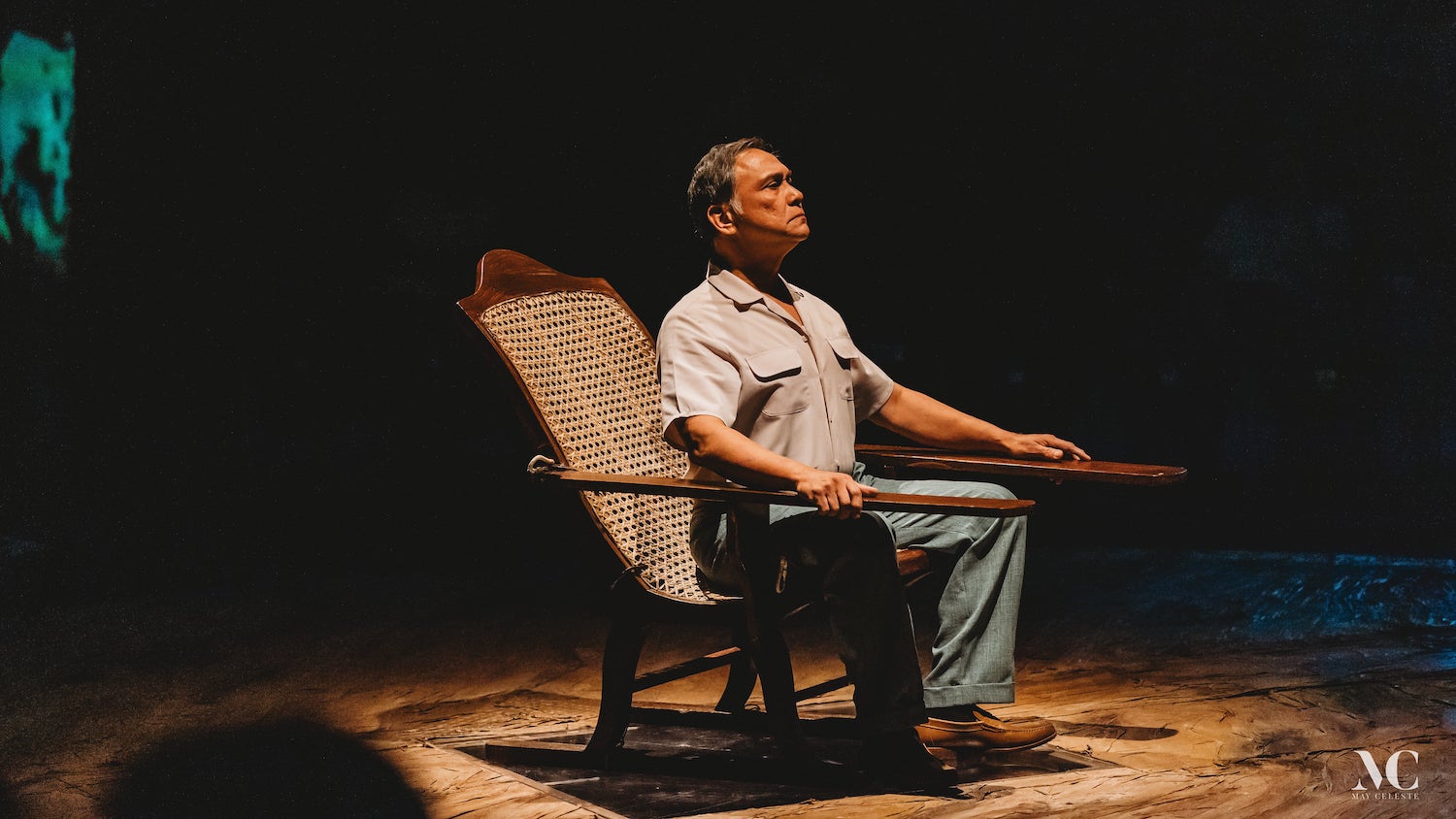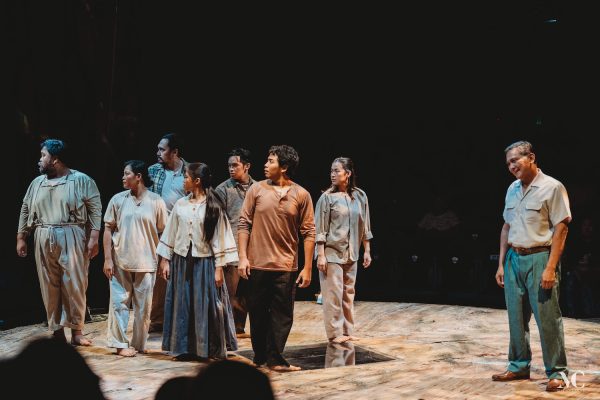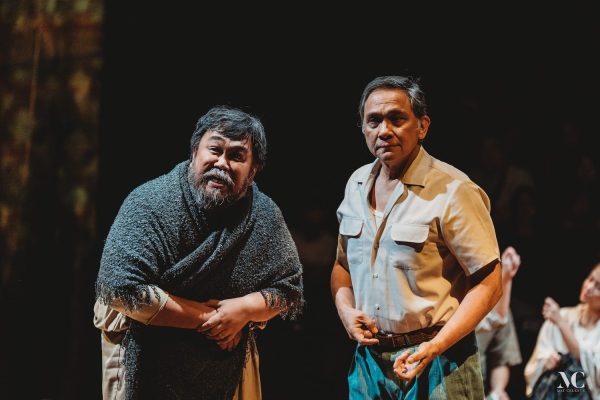
REVIEW: ‘Balete’ is a masterful look at privilege and inequality
There’s a synergy on Balete’s stage that is rare and perhaps even only seen when Chris Millado is on the helm of a production–a creativity and innovativeness that feels both fresh and profoundly reflective.
Tanghalang Pilipino’s stage adaptation of F. Sionil Jose’s Tree is a rich, almost cinematic experience, anchored by a brilliant vision and equally impressive execution. Under the deft direction of Chris Millado, with a script by Rody Vera, this production offers a layered look at the complexities of privilege, inequality, and generational ties, set against the backdrop of a rural, feudal Philippines.
Balete tells the story of Francisco, a young boy born into privilege, and his gradual awakening to the realities of class inequality around him. As Francisco matures, he begins to see the ways in which his father’s power and wealth shape the lives of the people around them. Through his eyes, we are able to witness the stark contrasts between the privileged and the oppressed and the systems that perpetuate these divides.
Pillar Performance
At the heart of the production is the presence of Nonie Buencamino, who delivers an astounding performance as Francisco, the story’s protagonist, at every stage of his life. Buencamino also portrays Francisco’s father, a choice that powerfully reinforces one of the production’s key themes: the inescapable shadow of legacy and the influence of one’s lineage.
Buencamino impresses, deftly shifting between boy, and man, and father, through subtle changes of gait, or movement, or expression, without ever tipping overboard that it takes you away from his breathtaking storytelling.
The story, being told in vignettes from the boy’s life, is punctuated by English monologues. It may be a nod to the source material, and perhaps to hammer home the privileged point of view of which we’re seeing the story, but they feel somewhat jarring here, contrasting against the predominantly Filipino dialogue, and not helped by Buencamino’s at times unnatural delivery of them.

Nonie Buencamino with the Tanghalang Pilipino Actors Company; Photo Credit: May Celeste
With him, TP’s Actors Company form the show’s ensemble, each taking on various roles and disappear into them, notably Marco Viaña as the boy’s grandfather and later on a free-thinking uncle; Jonathan Tadioan as a caring, elderly cook; Toni Go-Yadao as the boy’s tightrope-walking friend and later on the father’s lover; and Lhorvie Nuevo-Tadioan as a young headstrong maid.
Privileged Perspective
If the first act gives the boy–and the audience–a glimpse of the reality actually at play, it is in the second act that the story’s dark undercurrents of class struggle and feudalism are illuminated more vividly. The father now takes center stage, showing the extent of how men like him have true, actual power over the lives of others.
The production doesn’t shy away from the uncomfortable truths it presents, but its privileged perspective raises complex questions. At times, it feels as though the narrative uses the suffering of the oppressed to serve as a moral lesson for the privileged, a framing that leaves one wondering if the voices of the oppressed are fully heard or if they are merely vehicles for the protagonist’s own awakening.
Roots of Inequality

L-R: Jonathan Tadioan and Nonie Buencamino; Photo Credit: May Celeste
One of the most striking elements of this adaptation is its setting: a hollowed-out balete tree, designed by Wika Nadera. The balete is a poignant metaphor—an ancient, unmoving witness to the cycles of inequality, privilege, and generational power that the story explores. Just as the balete is deeply rooted and immovable, so too are the entrenched social systems that Francisco comes to see more clearly as he grows up. The set provides an intimate and haunting visual frame for the events, subtly reminding the audience that while individuals may change, the structures they live within often remain stubbornly the same.
The fluidity of time and space on stage is masterfully handled through the use of movement (Delphine Buencamino serves as associate director and movement director). The ensemble shifts seamlessly between settings, with deliberate, often symbolic, gestures that nevertheless effectively convey the story and subtleties being told on stage.
This is further complemented by the projection design by Jana Jimenez, and the sound design by Teresa Barrozo, which all together create a multi-sensory experience that immerses the audience in this world that look and feel idyllic when we see it through the boy, and harsh and real when we see it through his father.
There’s a synergy on Balete’s stage that is rare and perhaps even only seen when Chris Millado is on the helm of a production–a creativity and innovativeness that feels both fresh and profoundly reflective. It’s a work that confronts us with the values that for all the harm they’ve done, remain firmly rooted in our culture, immovable and persistent like a balete tree.
Tickets: Php 1350 – Php 2000
Show Dates: September 13 – October 6, 2024
Venue: CCP Black Box Theater, Malate, Manila
Running Time: approx. 2 hours and 30 mins (w/ 10 min intermission)
Credits: F. Sionil Jose (novel), Rody Vera (playwright), Chris Millado (direction), Delphine Buencamino (assistant direction / movement direction), Teresa Barrozo (music direction and sound design), Wika Nadera (set design), Carlos Siongco (costume design), Jana Jimenez (projection design), Roman Cruz (lighting design), Sabrina Basilio (dramaturgy)
Cast: Nonie Buencamino, Jonathan Tadioan, Marco Viaña, Lhorvie Nuevo-Tadioan, Toni Go-Yadao, Gelo Molina, Earvin Estioco, Ynna Rafa
Company: Tanghalang Pilipino


Comments